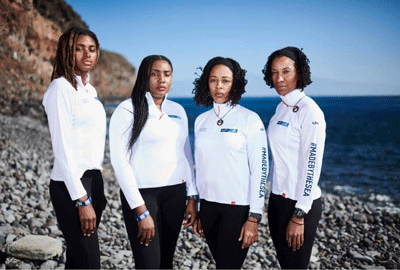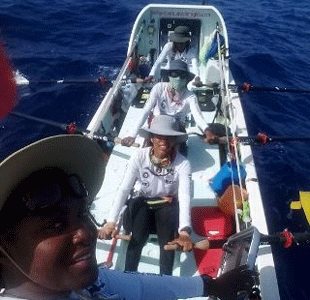The four Antiguan women who made a triumphant rowing trip across the Atlantic Ocean made a stop at a school near Baltimore to encourage young ones that they too can achieve dreams that sometimes appear unreachable.
The Baltimore Times had an opportunity to speak with three of the women, Kevinia Francis, Samara Emmanuel, and Christal Clashing, about their historic journey. The fourth team member, Elvira Bell, wasn’t immediately available.
“When I came about this expedition, what attracted me was the opportunity to retrace that slave trade route. To be able to do something as historical was great motivation for me,” Clashing said. “It combined my love of history, adventure, Antigua and of becoming a pioneer.”
In January, they became the world’s first all-black team and the first all-women team to represent the Caribbean to row across the Atlantic Ocean as part of the annual Talisker Whisky Atlantic Challenge— considered the world’s toughest row.
The competition, which the women participated to raise $150,000 for Cottage of Hope, a charity that focuses on providing shelter for orphaned girls who experience abuse, is a premiere event in ocean rowing.
Dubbed “Team Antigua-The Island Girls,” they began the journey on December 12, 2018, in the Canary Islands and returned to Antigua to a hero’s welcome on January 29, 2019.
The 3,000-natuical mile route was the same route used during the international slave trade hundreds of years earlier.
“We had nine months to prepare,” Emmanuel said.
For Francis, the expedition proved a real challenge because she had to take swimming lessons and she has never been fond of the outdoors.
“I’m an athlete, but I’m a land athlete,” Francis said. “I worked with one of the guys from last year’s team and they said they were looking for an all-female team and he knew that I loved adventure.”
Francis says she first needed to test the waters because she doesn’t “like the ocean touching me.”
“So, I had a fear of the unknown. However, my love for adventure, competition, country and charity was bigger than my fear of ocean life,” Francis said, noting that for peace of mind, she took swim lessons to help her survive in case anything should happen.
“We encountered a rogue wave. It wasn’t a treacherous or windy night at all, it was actually a very calm night but out of nowhere, there was a rogue wave that slammed against our boat and it went 90 degrees perpendicular, shoving me into the safety strap and throwing us all for a loop,” Francis said. “There was no night light, it was pitch black, and we didn’t know what that wave looked like or where it came from. There was absolutely no one around. We were paranoid the rest of the way after that.”
Once the trip began, the women said each team member had a responsibility.
Francis served as captain, which meant motivating the team, monitoring their progress and making decisions for the good of the crew. Emmanuel, with her boating experience, entered the coordinates that the weather team directed them to, maintained the boat log and handled most of the mechanical and electrical repairs. Bell was in charge of maintaining the boat’s order and cleanliness, and she dealt with the water maker when it acted up. As a self-proclaimed “water baby,” Clashing explained that she “had the task of jumping overboard into the Atlantic to clean the hull of the boat of barnacles that slowed the boat down,” which she had to do four times during the crossing.
According to ESPN, the women were competing with other teams and trying to finish as quickly as possible, so someone always had to be rowing. Most of the time, two people were rowing and two were resting, in two-hour shifts. Rest time included eating, preparing food, washing, using the bathroom, maintaining the boat and sleeping. The rowers slept in the two cabins at each end of the boat, which fit one person each.
“We didn’t finish first, but we finished and, for me, the most important thing that stood out was that it’s usually a white male dominated race,” Emmanuel said. “We were also retracing the slave route coming off the coast of Africa back to the Caribbean and that stood out for us as well. And the fact that in the end, our country was proud and our charity was proud.”

